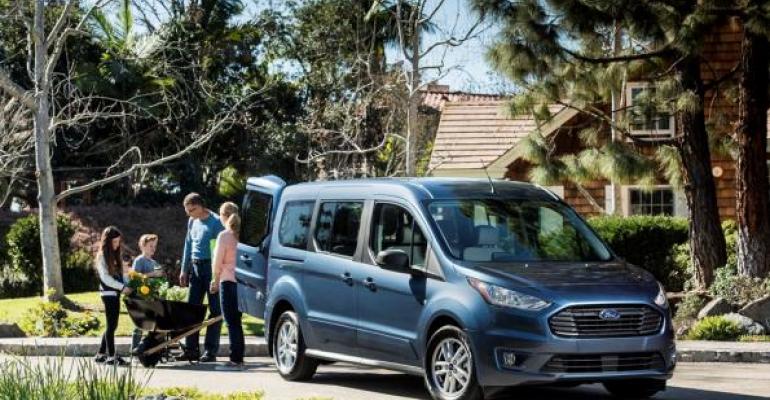Ford touts its redesigned ’19 Transit Connect Wagon as a vehicle for Baby Boomers on the go.
Unveiling the vehicle at the Chicago Auto Show, the automaker says predecessor models have won over certain Boomers who while growing up drove vans, not minivans.
The redone model from Ford’s commercial-vehicle unit and offering seating up to seven, is intended to increase sales and keep those demographically significant customers.
Although 20- and 30-something Millennials are the darlings of the auto industry, Ford says Boomers (born from 1946 to 1964) remain 111-million strong and hold 63% of American financial assets. One in three of them plan to purchase a vehicle in the next three years, according to AARP, a torchbearer for graying Boomers.
Ford limped out of the minivan segment about 15 years ago after less-than-stellar runs with its Aerostar and Windstar. Today, the automaker bills its redesigned ’19 Transit Connect Wagon as a less-expensive alternative to minivans, a segment that’s less popular than it once was.
No, the Transit Connect Wagon is not a minivan in disguise, but “absolutely” it too is a people mover, John Ruppert, Ford’s general manager-commercial vehicle sales and marketing, tells WardsAuto.
“We’re not competing with minivans, but the Transit Connect Wagon is more affordable,” he says. “It’s a people mover with lots of flexibility,” including fold-down second- and third-row seats.
Imran Jalal, Ford’s manager-commercial vehicle communications, adds: “It targets customers who are on a tight budget. Minivans are out of reach for them. These are entrepreneurs with families.”
The base price of the current model is $25,800. Ford hasn’t announced pricing for the replacement that goes on sale this fall.
The Transit Connect Wagon’s sister vehicle is the Transit Connect Cargo Van which has 80% of the mix. Ford’s goal is to increase the wagon’s share to 25%. Ford sold 34,473 Transit Connects last year, according to WardsAuto data.
Transit Connect debuted in the U.S. nine years ago as the first small van of its kind. “We entered white space in the market,” Ruppert says.
Other competitors eventually weighed in, including the Chevrolet City Express, Nissan NV200, Ram ProMaster City and Mercedes-Benz Metris. But Ford remains the market leader.
The vehicle debuting in Chicago is a third-generation model. “All of our competitors are on their first generation,” Ruppert says.
The ’19 model features new driver-assist features, including standard automatic emergency braking. Ford says offering that as standard equipment is a segment-first. Adaptive cruise control and blindspot detection also are available as options. Also available is Wi-Fi for up to 10 devices.
The vehicle comes in two wheelbases to accommodate five or seven passengers. Trim levels in ascending order of accoutrements are XL, XLT and Titanium. The automaker says its Transit Connect Wagon can be built to meet various customer needs.
Ford highlights one such customer, Kevin Brown, age 63, of Nassau Bay, TX, calling him an “active Boomer” and a grandpa surfer (Gulf Coast) who grew up driving vans in the 1970s.
He says he loves his ’14 Ford Transit Connect Wagon, using it for his work as an illustrator and custom T-shirt printer. Off hours, he loads it up with his surfing stuff and hits the beach with his family. “My Transit Connect lets me pull double duty,” he says.
The ’19 model comes with a 2.0L 4-cyl. direct-injection base engine. Auto start-stop is standard.
Optional is a new global powertrain, a 1.5L EcoBlue diesel engine that first debuted in Europe. Its expected highway fuel economy is 30 mpg (7.8 L/100 km), Ford says. Both engines are mated to an 8-speed transmission.





